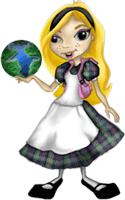UK Children Go Online: Emerging Opportunities and Dangers is a large and systematic study of the “nature and meaning of children’s internet use and maps emerging paterns of attitudes and practices across diverse contexts and social groups in the UK.” The report has some interesting stuff about the risks of children encountering porn (57% of 9-19 regular users have come across porn) and the risks of online communication (“parents underestimate” it).
At the site you can get copies of their reports and links to comparable reports elsewhere.
 Alice is a programming language developed at Carnegie Mellon that is designed for teaching programming, especially to girls. It uses a drag-and-drop interface and it focuses on creating virtual worlds, animated movies and simple games that can be exported to the web. They have just recieved support from Electronic Arts to use The Sims content (characters) to enahce the sophistication of the resulting animations. The development of Alice is driven by research into teaching programming.
Alice is a programming language developed at Carnegie Mellon that is designed for teaching programming, especially to girls. It uses a drag-and-drop interface and it focuses on creating virtual worlds, animated movies and simple games that can be exported to the web. They have just recieved support from Electronic Arts to use The Sims content (characters) to enahce the sophistication of the resulting animations. The development of Alice is driven by research into teaching programming.